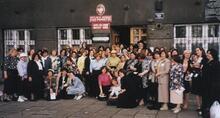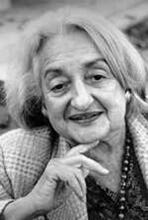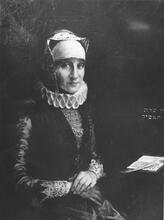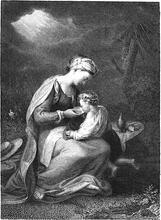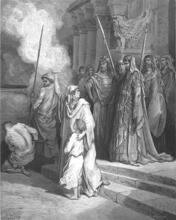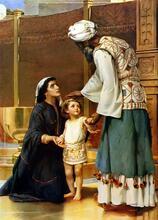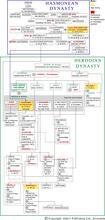Imma Shalom
In the 1st century CE, Imma Shalom was the sister of a powerful Rabbi and wife of an eminent sage. She defended her husband when he disobeyed the wishes of his colleagues. She also challenged the tradition of giving shares of a father’s estate only to his sons and a judge awarded her part of her father’s estate, although the judge reversed himself after being bribed by her brother.
Article
Imma Shalom (Mother of Peace) is identified in the The discussions and elaborations by the amora'im of Babylon on the Mishnah between early 3rd and late 5th c. C.E.; it is the foundation of Jewish Law and has halakhic supremacy over the Jerusalem Talmud.Babylonian Talmud as the wife of R. Eliezer, a prominent sage who flourished circa 75 CE, and the sister of Rabban Gamliel of Yavneh, the head of the Sanhedrin. She is mentioned only a few times in rabbinic literature. After R. Eliezer defied his colleagues in the story about the oven of Aknai, his wife tried to save him from the harm she predicted would befall him. However, she failed because she erred regarding the New Moon (BT Baba Mezia 59b).
Upon hearing her husband predict that a student who treated him disrespectfully would not finish out his week, she asked him if he were a prophet (BT Eruvin 63a). When queried why her children were so physically attractive, she answered that when she and her husband engage in sexual intercourse he behaves as if “forced by a demon.” He does so, he told her, to avoid thinking about other women (BT Nedarim 20a–b). In a hypothetical dispute about whether or not daughters, like sons, inherit from their fathers, Imma Shalom came before a judge. He awarded her a share of her father’s estate. Her brother bribed the judge who then reversed himself.
Note that it is a woman who challenged the law of disenfranchisement of daughters. The judge sided with her, as did the Sadducees ((Aramaic) A work containing a collection of tanna'itic beraitot, organized into a series of tractates each of which parallels a tractate of the Mishnah.Tosefta Yadaim 2:20; BT Baba Batra 115b; JT Baba Batra 8:1; 16a). Although the judge was exposed as a fraud, his fair-minded decision struck a resonant chord with the rabbis. Maybe they placed this question in the mouth of a woman because they sympathized with the justice of her claim but could not bring themselves to rule in the same manner (BT SabbathShabbat 116b).
Ilan, Tal. "The quest for the historical Beruriah, Rachel, and Imma Shalom." AJS Review 22, no. 1 (1997): 1-17.
Sobolev-Mandelbaum, Liat. "Immah Shalom: The Controversial Role Model." Women in Judaism: A Multidisciplinary e-Journal 14, no. 2 (2017).

